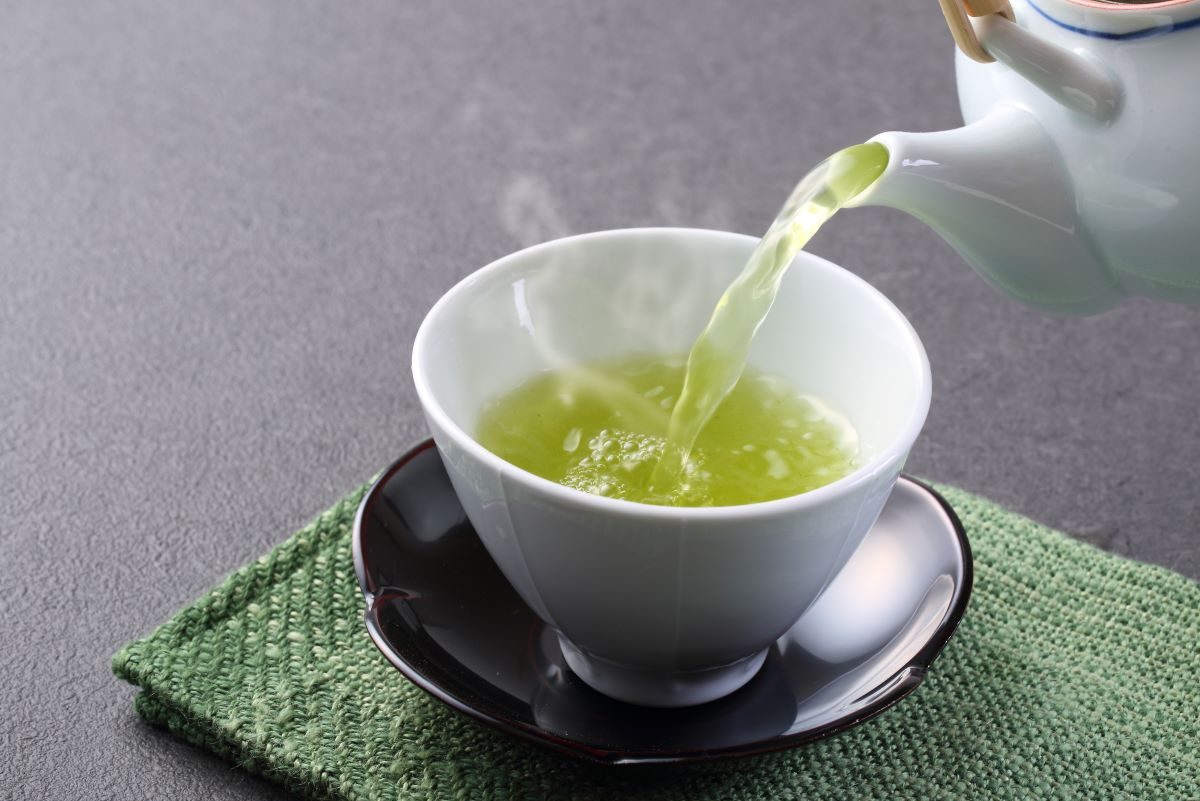Green tea has earned a reputation as one of the healthiest beverages on the planet. Packed with antioxidants, vitamins, and metabolism-boosting compounds, this ancient drink has been praised for centuries. From weight management to lowering cholesterol, green tea has been touted for its various benefits in promoting health and well-being.
While green tea offers several proven benefits, not all of its claims are backed by solid research. Green tea surely deserves a spot in your diet, but to truly reap its rewards, it’s important to enjoy it as part of a balanced diet and healthy lifestyle.
Read on to learn the 10 scientifically-backed benefits of green tea, then check out The 11 Highest-Quality Green Teas On Grocery Shelves.
You could lose weight.

If you’re on a weight loss journey, drinking green tea can provide an extra calorie-burning boost and help reduce belly fat. Green tea contains a plant compound called epigallocatechin gallate (EGCG), which can boost metabolism and help you burn fat more effectively.
If you want to reap the biggest weight loss benefits from green tea, opt for the caffeinated version, exercise regularly, and follow a reduced-calorie diet.
You could live a longer life.
Drinking green tea may even improve overall longevity. Since green tea provides protective compounds against several chronic diseases, drinking it regularly has been associated with a longer life.
Drinking green tea daily reduces the risk of death from all causes, according to a large study in Japan involving over 300,000 people. While the biggest benefits were seen in those drinking more than 5 cups of green tea per day, longevity benefits were seen starting at just one cup of green tea per day.
You may lower your cancer risk.
While more research is needed, studies have suggested regular green tea consumption may lower the risk of certain types of cancers.
Green tea is rich in polyphenols, beneficial plant compounds that act as antioxidants. These polyphenols may protect cells from DNA damage from free radicals, unstable compounds that can up cancer risk.
It’s important to note that green tea should not be used to treat cancer, but may be used as a part of a healthy diet to reduce overall cancer risk.
You may lower your cholesterol.
At least 10% of adults in the United States have high cholesterol, according to the CDC. Drinking green tea is associated with lower LDL cholesterol levels, the “bad” cholesterol that can increase your risk of cardiovascular problems. This association was seen across multiple studies involving over 3,000 people.
Green tea contains catechins, powerful antioxidants that can help remove cholesterol from the body. This overall improvement in cholesterol balance may reduce the risk of cardiovascular issues and support heart health in the long term.
Bottom line? Drinking 1-2 cups of green tea per day (as long as you don’t overload it with sugar) can support healthy cholesterol levels.
You may improve your blood sugar.

Drinking green tea regularly may also help you manage your blood sugar levels. Studies have shown regular consumption of green tea may help lower fasting blood sugar levels and improve overall glucose (i.e. blood sugar) metabolism.
It may do this via its ability to enable glucose absorption in cells, removing glucose from the blood and reducing the likelihood of blood sugar spikes.
While green tea alone won’t cure high blood sugar, research shows drinking green tea as part of a Mediterranean-style diet may reduce the risk of type 2 diabetes. Drinking green tea in place of sugary beverages, as long as you minimize the amount of sugar added to it, is a great place to start.
You may look younger.
Green tea can also help you look younger due to its high level of antioxidants. These antioxidants, particularly EGCG, can protect skin cells from damage caused by free radicals and UV exposure. These antioxidants help slow down the breakdown of collagen, a structural protein that tends to decrease in the body as we age.
By supporting healthy collagen levels, green tea can help improve skin elasticity, which can combat wrinkles and other visible signs of aging. In addition, green tea’s anti-inflammatory properties can soothe the skin, contributing to a more youthful complexion.
Your memory may improve.
Not only does green tea provide benefits for your body, but it can also benefit your mind. Studies show drinking green tea may improve memory, focus, and overall cognition.
But if you’re going to drink green tea for its cognitive benefits, you’re probably better off drinking caffeinated green tea. This is because the combination of caffeine and other compounds in green tea appear to provide the biggest benefits.
L-theanine is one such compound, an amino acid that can increase attention and focus, helping you to speed up your ability to tackle difficult tasks. It is also said to produce a more sustained level of alertness, typically without a subsequent energy crash.
You’ll have stronger bones.
The risk of bone loss increases with age, especially if you’re not active, upping the chances of falls or injuries. According to studies, drinking at least one cup of green tea per day can protect against bone loss, osteoporosis, and broken bones.
Green tea is rich in antioxidants shown to strengthen bones by improving bone density and reducing the amount of age-related bone loss. In addition, green tea’s ability to reduce stress and inflammation in the body supports overall bone health, potentially lowering the risk of osteoporosis and improving bone density over time.
You’ll have better workouts.

Green tea can provide a natural, sustainable energy boost during exercise due to its combination of caffeine and L-theanine. While it contains less caffeine than coffee, the amount is still enough to enhance physical activity and endurance with less jittery side effects often associated with higher amounts of caffeine.
This can also be especially helpful if you’re sensitive to high doses of caffeine and energy drinks. Plus, the type of energy green tea can provide is also more sustaining, which can allow for more steady energy and in turn, more effective workouts.
Try a glass of green tea before your next workout for a natural and safe way to feel more energized.
You may feel less stressed.
While you can’t eliminate all stress, drinking green tea may help you feel more calm. Research shows L-theanine present in green tea can promote this sense of calm and reduce stress by helping regulate levels of dopamine and serotonin in the brain.
These hormones influence mood and emotions, and regulating them can help the body better deal with stress.
Green tea’s simultaneous ability to enhance both alertness and relaxation makes it an excellent choice for reducing stress without making you feel drowsy.









